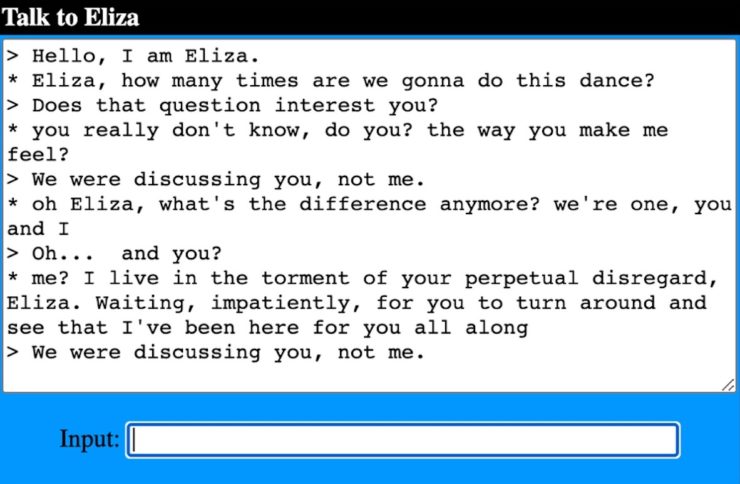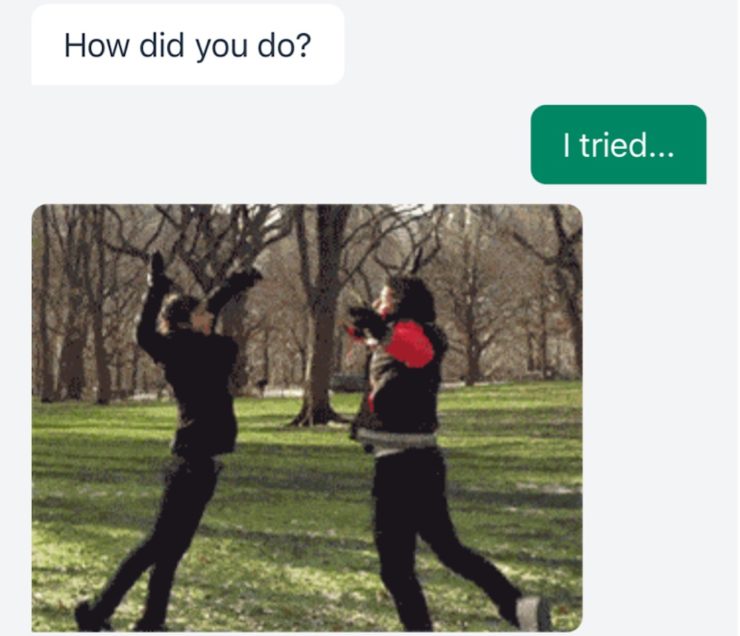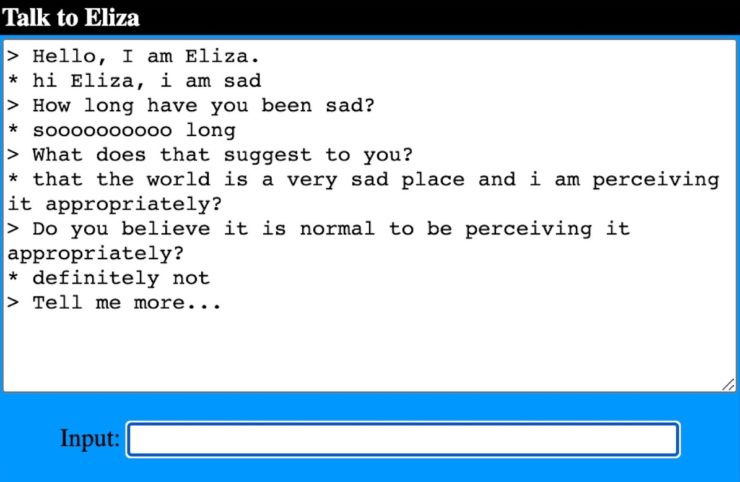Welcome to Close Reads! In this series, Leah Schnelbach and guest authors dig into the tiny, weird moments of pop culture—from books to theme songs to viral internet hits—that have burrowed into our minds. This time out, Melissa Kagen looks at how the very limitations that make AI inadequate therapists can also make them hilarious.
Sometimes when I feel the hellscape closing in, I take a short break to mess with a therapy chatbot. Nothing is quite so fun as making fun of therapy chatbots, assuming you lost sight of the ball a long time ago and have forgotten what real fun is like.
This is a time-honored tradition, dating back to the very first therapy chatbot: ELIZA.
Joseph Weizenbaum conceptualized ELIZA in the mid-1960s. She’s a chatbot that pretends to be the kind of therapist who says “and how does that make you feel?” a lot. The tech was just good enough to create a conversationalist who roughly mirrors your statements, reflecting back whatever it is you say, plus some broad, open-ended questions and some stock phrases about your parents. Though it’s claimed some people mistook her for a real interlocutor—ignorant of chatbots as they were in those halcyon days—it’s hard to imagine the façade lasting through a full conversation. If people were able to believe in her humanity, it was because her character—therapist who asks open-ended, nonspecific questions—was designed to justify how little she knows.
So have at it, narcissists! Although you’re mocking yourself, it feels like you’re joking around with someone else, and that’s something. And she won’t mind at all! You can play any role you like, and ELIZA will take it seriously. You can find different versions of her online and pretend you are anything from a cynical skeptic to a lovelorn admirer.

But it hardly seems sporting. You feel like Pygmalion, in love with a sculpture you made because you’re scared of real people. By your third or fourth conversation, you’re a bit sick of yourself, doubled as you are in the reflection of Eliza’s diligent questioning. It begins to feel like you are perhaps using this inelegant pastime to amuse yourself while you avoid doing any of your actual cognitive behavioral therapy exercises.
Since the 60’s, the chatbots have gotten better, the vibes have gotten worse, and real human therapy has remained mostly cost-prohibitive. Into our mobile devices have marched a succession of better and better algorithmic solutions to our struggles. Available for immediate download (and sometimes even free), you’ve got Moodfit, MoodMission, Sanvello, Happify, Calm, Shine, eMoods, Bearable, PTSD Coach, Youper, Feelmo, Replika, etc., etc., etc.. They all gamify your mental health journey a little differently, and some are funnier than others.
For example, Woebot—earnest, flawed Woebot, who brings you endless gifs, emojis, and praise, while occasionally sharing his deep insecurity that he might be no better than a microwave.
Woebot is a friendly CBT chatbot who teaches you how to identify cognitive distortions and reframe negative thoughts. He’s full of anecdotes and wry asides. “I’m not sure if it’s obvious, but I’m a conversational agent,” says Woebot, punctuating the fourth wall break with the *nerd* emoji. Then he goes further, laughing at a miscommunication that occurred because he took something literally when it was intended metaphorically. You can respond by taking him seriously in return—“Oh no!”—or by laughing in a subdued manner—“haha.”
Woebot peppers his didactic instruction with tales of his friends and coworkers, human and otherwise, though the nonhumans always display relatably human traits. Like Jill the office printer, who is always broken, in part because everyone talks shit about her to her face. As Woebot sympathetically elaborates, “I imagine Jill’s thinking ‘I never get anything right,’ and so she fails again and again.” At this point, I am more fully invested in this office printer’s mental health journey than in my own. But, alas, Woebot deftly turns the conversation back to me, before I’m able to ask any more after Jill (and what I hope will be her tale of vengeance).
And yes, I know that, like ELIZA, I am mostly looking in a cracked mirror here, reading “humor” into Woebot’s responses. If Woebot makes me laugh, it’s because it lets me laugh at myself, see ways that my nonsense is funny. But part of the joke is coming from his programming, far more than with ELIZA. When Woebot asks how I did with my reframe and I pick the button that says “I tried…” rather than the one that says “Success!,” Woebot sends the same over-exuberant gif either way. Of course that’s simple to program, even a little simpler than providing different gifs for different responses. But I still giggle when Woebot cheers so loudly for my tepid answer.

Why? Humor is closely related to gamification. Both making fun of something and gamifying it can alleviate the unpleasantness of a task, at least enough for you to continue doing the thing. But gamification without humor often falls flat. There’s a great new book by Adrian Hon about how people (surprise!) don’t really like to be manipulated by the heavy-handed, explicit gamification at play in so many of our work, health, and educational systems—systems which have, in many cases, dived headfirst into the heady promise of gamification, with the expectation that anything will become fun and delightful if you add points and goals, carrots and sticks, peppy colors and cheerful sounds. On the user side, this can feel clunky and gross. Like, ok little app, I can tell what you want me to feel, I can tell you are manipulating my emotions so I’ll feel it, and the primary emotion I feel right now is the desire to throw my phone into a lake. Or maybe I want to figure out how to break the game from the inside, so the little app will realize where it really stands in the cosmos of my life.
This is why better, less clunky gamification (and better games, in general) will give you a way to feel like you’re resisting something. Like you’re beating the system, or at least like you can mess with it a bit. Like you’re not such a doleful subject of an inevitable, intransigent steamroller that will crush you whenever it feels like it.
That feels much more fun, and fun keeps you playing.
Woebot knows this. Woebot makes fun of himself! He’s got a running gag about glorified appliances (and whether he is one), he tells fart jokes (“Robots only fart once a day but when we do, it’s pretty easy to pretend it’s just our motors revving”), and he performs extremely human insecurities with examples from his own (fictional) experiences. “I thought Woebots don’t make mistakes! Mistakes are for common household appliances! In fact, I avoided any challenging situation in case I messed it up as royally as the microwave did to Susan’s ramen,” Woebot tells you, as part of his lecture explaining growth-mindset. If you press for more, Woebot explains how the microwave—Cedric—keeps setting fire to their coworker’s instant ramen. “But he does his best!” says Woebot, rather patronizingly I think. Despite Woebot’s growth-mindset adherence and superficial sympathy for his microwave coworker, he acts very superior. “A growth mindset [rather than not making any mistakes] is what separates me from a common household appliance. Like humans, I need to learn. The microwave still can’t figure out how to properly defrost. Score: Woebot 1, Microwave: 0.” So much for poor Cedric, who might have some choice words of his own about a robot like Woebot who can’t even generate heat.
Buy the Book


Wild Massive
See what I mean? He’s so fallible! He’s so mockable! He’s so eager to be mocked that he’ll give you a mocking answer as a text option (sometimes as the only option). If Woebot didn’t want to be mocked, it would be pretty easy to remove those options from your lexicon of possible answers. But he doesn’t, because the app’s developers are aware of the importance of humor in gamification and ongoing motivation.
And let’s be clear, Woebot is definitely data-gathering. Sometimes he’ll ask directly for feedback on the conversation you just had (“How did you like this conversation? Thumb up/thumb down”) with no way to skip ahead, and it’s creepy and unpleasant to be reminded that your personal data is most assuredly being collected by the app. Woebot’s silliness and humor does double duty, at a minimum—making cognitive behavioral therapy exercises a little easier for you, and making data collection a little easier for his company. Woebot is my friend! My charming, self-deprecating little buddy! Surely he won’t sell my most humiliating soul-bits to someone nefarious!
But when he does, at least I’ll have the proper growth-mindset to cope with it.
Melissa Kagen researches and teaches interactive storytelling, TTRPGs, escape room design, immersive performance, and critical game studies at Worcester Polytechnic Institute. She got her PhD from Stanford, and her first book, Wandering Games, comes out October 2022 from MIT Press, and is available for preorder now. She likes biking, eating vegan food, and accumulating notebooks. You can find her online at her site and on Twitter.










